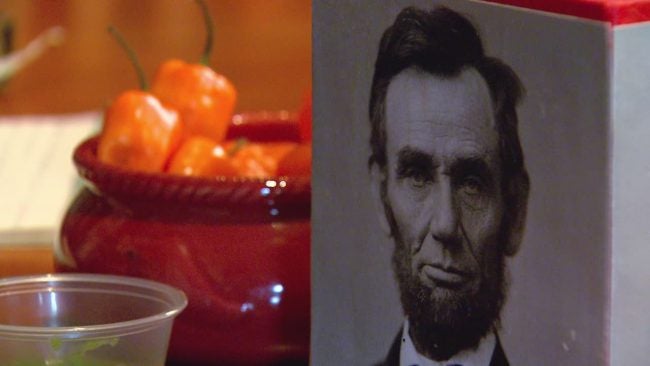Indiana Historical Society introduces ‘Hot Pepper History’
INDIANAPOLIS (WISH) – As part of our celebration of Indiana’s Bicentennial, we’re taking a look at history that will make you cry.
Or cough. And possibly wheeze a bit.
It happened inside The Eugene and Marylin Glick Indiana History Center. You may already know the building as an important repository of historic items. You may not know it (yet) as a recording studio.
From time to time, the Indiana Historical Society staff has turned the Center’s library into a small-scale gustatory torture chamber, combining history with habanero peppers. Put simply: A staffer prepares a history lesson, takes a big bite of pepper, and then tries to deliver the lesson on camera while dealing with the heat of the pepper.
“We didn’t really feel comfortable doing a ‘Drunk History’, so this seemed at the time to be a safer thing,” explains the Society’s Amy Lamb. The show she referred to, “Drunk History“, is a boozy, irreverent riff on history via Comedy Central. The Historical Society’s version is called “Hot Pepper History”, essentially swapping out the alcohol for pain.
The results defy easy explanation. Some of the storytellers barely sweat, while others struggle to even finish simple sentences. Depending on the viewer’s appetite for other people’s misery, the results are either hysterical or uncomfortable, but memorable either way. The viewer is left to laugh or wince, and learn.
Especially ‘effective’ editions are here. And here. And here.
Lamb said there are two goals of ‘Hot Pepper History’. One is to offer the Society team a chance to break loose of the traditional stereotypes of historians as boring and humorless. The other goal is to reach out to a wider audience. On that score, it seems to be working; Lamb said YouTube subscriptions have tripled since January.
So if you are a history buff, or a little sadistic, consider subscribing to the Indiana Historical Society’s YouTube channel. There you will find many conventional (aka non-habenero) stories about Indiana’s rich history, and several new editions of Hot Pepper History that also appear each month.
